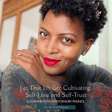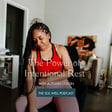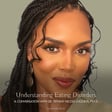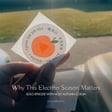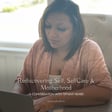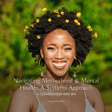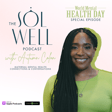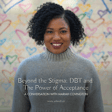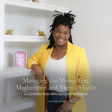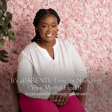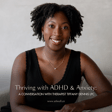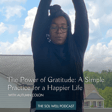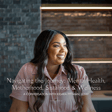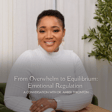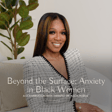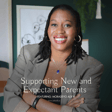Become a Creator today!Start creating today - Share your story with the world!
Start for free
00:00:00
00:00:01

Addressing Racial Trauma in Early Childhood Development with Dr. Anjali Ferguson
In this episode, we dive deep into the world of racial trauma with Dr. Anjali Ferguson, a clinical psychologist specializing in trauma-informed and culturally responsive care.
Key takeaways:
- Understanding the impact of racial trauma on individuals and communities of color
- The importance of early childhood development in shaping responses to racial trauma
- The role of trauma-informed and culturally responsive care in healing
- Strategies for building resilience and supporting children exposed to racial trauma
- The power of community and advocacy in dismantling systemic racism
Dr. Ferguson shares her expertise on:
- The connection between racial trauma, mental health, and physical well-being
- The importance of open conversations about race and identity within families
- The role of education and media in shaping perceptions of race and culture
- Practical steps parents and caregivers can take to foster resilience and cultural pride in their children
Resources mentioned:
- Parenting Culture: https://parentingculture.org/
- Embrace Race: https://www.embracerace.org/
- An Ordinary Day in 2021: Get it on Amazon
Join the conversation! Share your thoughts and experiences on social media using #SolWellPodcast and #RacialTrauma.
Connect with Dr. Anjali Ferguson:
- www.draferguson.com
- instagram.com/dranjaliferguson
- youtube.com/channel/UCWcIMngG9sK1iJ7TK-Ha5BA
- linkedin.com/in/anjali-ferguson-4a915631/
Let’s continue the conversation about racial trauma and work towards a more just and equitable society.
Don't forget to subscribe to Sol Well for more inspiring stories and practical advice!
Want to be a guest on the pod? Send us an email to podcast@solwell.co
Transcript
Introduction and Goals
00:00:05
Speaker
Welcome to the Soul Well Podcast, where moms of color find strength and community in the mental health space. Each week, we ignite inspiration as we set our intentions with affirmations and dive deep into honest conversations with fellow moms and mental health experts. We're here to hold space for you, to shatter stigmas and elevate the voices of moms of color. We'll fight for policy change, empower you with mindful resources, and most important remind you that you're never alone on this journey. It takes a village to raise a mother. Now let's meet at The Well.
Meet Dr. Anjali Ferguson
00:00:42
Speaker
Hey y'all, welcome back to The So Well podcast. I'm your host Autumn Colon. This week we are chatting with Dr. Anjali Ferguson. She is a clinical psychologist with an expertise in trauma-informed culturally responsive care and early childhood. um Dr. Ferguson is a TEDx speaker and author and a global resource on social equity and racial trauma. I am particularly excited for y'all to hear this episode because we got some really great resources and tips on how to have conversation with your children, how to discuss race, how to, you know, how to help them navigate whiteness. um So it's a really good
00:01:26
Speaker
conversation um to just listen to and even if you you know you think that your kid is too young to be having this conversation that's actually something that we spoke about in this interview that it's never too early to be having these conversations and so I hope you enjoy today's episode. Before we get started, I want to ground us in a affirmation. So today I'm pulling from the Black Girl Affirmed Deck by the brand OKNRX. And today's affirmation poll reads,
00:02:02
Speaker
even when the world shows me otherwise, I know my black life matters. Wow.
00:02:12
Speaker
I'm moved by this being the card because if you could see me visually, I did not look at what I was pulling.
The Importance of Race Conversations
00:02:20
Speaker
And this episode is being recorded during the week that our um now Vice President has been elected as a presidential nominee for the Democratic Party. It's also the week that we saw um on video another black woman life be taken by the police. and so to just pull this card that even when the world shows me otherwise, I know my black life matters. I know it matters. And that makes this conversation with our guests that much more important because it starts in your children's early childhood. It starts at home. And with that, let's go into today's episode. Hi, welcome to the show. Thank you for having me. I'm so happy to be here.
00:03:08
Speaker
Yes, I'm so excited to for this conversation. Welcome back listeners to the So Well podcast. Today I am joined by Dr. Anjuli Ferguson and she is going to be talking about all things racial trauma, early childhood development and herself and her background. And we're just going to jump right into the conversation by having you introduce yourself to the audience, telling us a little bit about um what you specialize in and just your background. Sure, yeah. and
00:03:42
Speaker
Thanks, everyone, for tuning in. I'm so happy to be here. So I am a clinical psychologist who has expertise in early childhood mental health, culturally responsive care, and trauma-informed care. And I'm also a mom of now two little kiddos. I have a four-year-old son and a five-month-old baby girl. And I am in a multiracial, multi-faith partnership. My kiddos are blendy in. much like our now new presidential nominee, Kamala Harris. My kiddos are Black and Indian, um so my partner is Black, and that is important because it has really informed how my work has shifted and changed over the last five to eight years, I would say, and really made me start to focus on race-based trauma or racial trauma as a necessary point for us to consider when we look at mental health
00:04:42
Speaker
and in raising our children and prepping them to be strong, resilient little beings in this world, which led me to develop parenting culture, which is now a nonprofit where we provide inclusive parenting resources to help parents have conversations related to race, gender identity, abortion, you name it. There's a guide out there. on our platform and we've got a podcast and I developed a children's book to help parents um talk to kiddos about race. So lots of
Understanding Racial Trauma
00:05:14
Speaker
little things, but race, conversations about race, that's my jam and I'm always excited to to be on and share about that work.
00:05:23
Speaker
Awesome. That's so amazing. I'm where at the end of the show, I'm going to have you leave a little bit of that information for our audience to go check things out. It sounds really amazing and something that I think is absolutely necessarily necessary. um If not now, I mean, it's always been necessary, but I feel like Just with the state of like the culture and the environment that we're in now like having these open Conversations like it has to happen. My children are a little bit older, right? I have a 10 and a 13 year old So they are exposed a little bit more to like what is actually happening in the world Like my son came to me yesterday and he was like mom and I was like what he was like a black woman is running for president and I was like I
00:06:10
Speaker
Like just so like he was so elated and so happy he was just like anybody but anybody with that guy and I was like I know like let's learn about who she is let's have a conversation about the significance of this and it just being you know, like so amazing that that she, that we are at this place, but there's still so much work to be done. um And for his little brain and his little mind, I'm just, he's so susceptible to the things that are out there. And so I would love for you to just talk about what racial trauma is, right? Like how, how, what is the term? How do we protect our children from it? Like let's get into what exactly is it so we can kind of ground ourselves in that.
00:06:54
Speaker
Yeah, that's a great question. So the term racial trauma really started to come about ah maybe about a decade ago, but it started to gain more momentum in 2020 after the murder of George Floyd. um But racial trauma refers to trauma symptoms. So trauma symptoms include impacts on your psychological well-being and physical health long term. And these could include things like mood disorders, disruptions in sleep and appetite. um Chronic stress also impacts health outcomes, like development of things like heart disease, cancer, diabetes in adulthood. All those trauma responses in the face of a racialized event or in the face of prejudice or oppression, where you experience racism, folks develop these trauma symptoms in response. And this can happen after a singular
00:07:49
Speaker
event related to racism, or as we know for communities of color, especially Black communities in this country and especially Indigenous communities in this country, repeated exposures to racism and oppression has this weathering effect on bodies. and has this chronic stress response. So that is racial trauma. And then why it's important again is because it is really prevalent and impacts, again, Black and Indigenous communities daily, and then other communities of color in different ways as well.
Personal Journeys and Racial Justice
00:08:23
Speaker
So we also know things like AAPI hate being on the rise.
00:08:26
Speaker
intergenerational impacts of things like immigration and immigration stress for various communities. All those have similar racial trauma impacts and cultural trauma impacts. Absolutely, absolutely. And do you think that there is a way for you to Protect your children from that. When you are raising Black and brown children, like I said, like I have a son. you know like And i I grew up in New York City, and he did too for the beginning of his life, but we now live in Georgia, in the in the South. And I, in New York, never felt like it's a melting pot. It's obviously racism there, but you grow up with people who don't look like you who like are in your neighborhood and outside of your neighborhood, so many cultures. um I had no fear for for that, for me growing up, but here.
00:09:20
Speaker
It's so different when you are driving in the country and you see a Confederate flag or the you know the Trump signs and you so see you feel the switch and the difference happening. like I'm scared for my son in a way that like i don't I didn't think that I would i would be like when i you know like when I had my child and think that this was something that I needed to think about. like How do you protect your children from that racial trauma? like you know it's out there and it's it's like inevitable with the with the messages and the videos and the constant media you know um yeah so i'm just as mom like how do we protect our kids yeah i mean because of all of those reasons that's really important we do work towards protecting them right and i think you made a few good points
00:10:07
Speaker
experiences of racism can look really different depending on parts of the country we live in or neighborhoods we live in, what our social networks look like. I grew up outside of DC also a very big melting pot and I thought I knew diversity and I thought I understood racism and I studied culture like my entire graduate career and then I met my husband in college and some of the things he like opened my eyes to him growing out up outside of Pittsburgh. I was like wow I never had to live in this kind of fear for just being the color of my skin but now I see what you're talking about when we moved to North Carolina and Alabama that was very different for us.
00:10:50
Speaker
It was physical fear started to manifest, but there were still psychological and mental impacts of like more covert forms of racism, even in DC and Northern Virginia, where I grew up that I don't think I was really completely registering growing up. oh So it comes in all these different shapes and forms, right? It's these like overt, really direct actions of racism that we know to denounce. Like, you know, we know the KKK is bad. We know saying the N word is bad. We know lynchings are bad. But there's also more covert forms of racism like microaggressions and more subtle ways that we chip away at the mental health and well-being of communities of color. And there are statistics now that black children experience five microaggressions a day. And that's not a small amount when we think of the compounding effects that this can have over time.
Racial Socialization and Family Discussions
00:11:42
Speaker
So it is so critical. And I think for me, what felt like
00:11:47
Speaker
it really lit this like passion and light under me and to really hone in on this work was after my son was born. Now I'm a mom and I want to protect my child in every way possible, right? Not just physically, but also mentally and emotionally. And I can't control everything somebody is going to say and do. I can't control who he's going to encounter, what that's going to look like. And there are some very real risks as he gets older in life. Right. And that fear that black bombs feel every single day, I started to get some semblance of that understanding. And that became terrifying to me and also became why I was like, we need to change the world for our kids. yeah What we do at home is really important and matters. And there's a lot of literature in black communities and you all just do this naturally.
00:12:40
Speaker
because you know your kids are going to face racism and discrimination. And we call that process racial socialization, but in mainstream it's called having the talk with your kids, right? Like you know to prep your kids with when you go out there, people are going to treat you differently. If you come across a police officer, keep your hands on the wheel. Do not talk back, right? Like these are life saving conversations that you're having with your kids and you just do naturally because you know they need to have that. Other communities don't necessarily have those conversations because we don't face the same types of risks. so
00:13:13
Speaker
growing up in an Indian household, my parents never sat my brother down and have those conversations or me down and have those conversations. And we should have had those conversations because we experience other kinds of oppression and hate. And if we don't have those conversations, we don't know how to be allies or accomplices for Black community members. um So the racial socialization process is critical that all families engage in, right? So that's a big first step is every parent should be talking about race with their kid. Every parent should be equipping their kids with how do you ah encounter differences and how do you cope with those differences so that you aren't othering or marginalizing people that are different from you. And if you find somebody harming you, how do you then cope with that? And how do you become really firm and strong in your identity so that you don't start to question whether you are blackness or your brownness
00:14:10
Speaker
is valid or worthy of being in a certain space, you have a lot of self-esteem regardless of where you're operating, you stay resilient in the face of those conversations. That happens at home, right? And that happens really early. um And I even, I like just Just a couple weeks ago, my my son was in playing basketball, and he's only four, and so a white child in basketball said, this stupid something, something, something, or the other. And he repeated it back to us. And we're like, mm-mm, sorry, you can't be talking like that. And he he kind of he looked at us like, what? And we're like, it's not even the fact that you said stupid. It's because you said it.
00:14:54
Speaker
you can get into trouble, whereas this white child won't, right? And those are conversations that my four-year-old is going to is starting to have already, that his white peers don't have to have, but all fall under this context of racial socialization to start to protect him against racial trauma down the road. Yeah. And and that Thank you for sharing that. And that, it actually like sparked something in me. It's like we're preparing our children, but what are our white counterparts doing with their children? How do we get the literature and the conversations happening in their households so they're not raising children who are
00:15:35
Speaker
who are hurting our children are because they're going to be the next generation, right? And I think there is some good in the next generation. I hear the conversations happening in Gen Alpha and Gen Z, like, you know, but there's still work, obviously, to be done because you have, you know, the boomers and you have these people still around, right, who have these views. And it's just it's hereditary, it's generational, it's passed down in a lot of cases. How can we as black and brown communities, I mean, it's not our responsibility, right? I feel like to educate them, but how do we continue to push them to to raise better children, you know, in this? Yeah, I think it's really just emphasizing that everybody needs to have these conversations regardless of race and background, because really, unfortunately for us to dismantle the systems that we're in,
00:16:23
Speaker
We need white allies and accomplices. And the only way we're going to get that is if folks start to face their implicit biases and recognize like,
Creating Safe and Joyful Home Environments
00:16:33
Speaker
hey, I got to talk about these difficult things with my kids. And a big part of why people avoid it is because they're so scared. of offending or saying the wrong thing and with kids they feel like kids aren't ready. Like kids aren't ready for the conversation and that is just false and so untrue. um Kids want information just like they ask us questions about all sorts of things like why is this this color? Why do we call this that? how Like you know they also have the same questions about race because kids start to notice race-based differences in infancy. Like by the time a child is six months old they notice race race differences in people.
00:17:10
Speaker
and they are trying to organize their world. And if we adults approach those responses that our kids are having with fear and avoidance and anxiety and judgment, then that's what our kids are going to take away from it too. Versus if we're welcoming and we're nonjudgmental and we create a space for them to have those conversations, then kids are going to be that way when they face people that are different from them. So really it is a big task that white families do need to take on um and and can take on if they were just willing to kind of put their own discomfort aside.
00:17:50
Speaker
Yes. Yes. Get outside of yourself. right like Get outside of that discomfort. um Thank you. I love that you said that. It's so important right like to reach to your partner. They're white families in the schools and in the church and you know wherever. I also have multicultural children. like I'm a black woman. My husband is Puerto Rican. um So I have Latina and, you know, black children, so my little Afro-Latinas. And my daughter, her skin complexion is much fairer than my skin complexion. So very early on, it was very obvious, like, why does Daddy look like this and you look like this? And like how to like, and just like starting to have that conversation.
00:18:32
Speaker
And so that brings me to my next series of questions, which is the early impact on children, right? Why is early childhood such a critical period when it comes to racial trauma? Why is that an area where we need to focus on as opposed to waiting until a kid has the language and the words and you know they can fully comprehend what's happening? Yeah. I mean, early childhood is just a critical point in development in general. um 90% of our brain excuse me is developed by the time we're age five. And in those early, early years, like I said, kids start to notice these differences in folks, whether it's gender differences or race-based differences. Kids as young as six months six months of age notice racial differences, and by two to four years old, they develop racial biases. So two to four years is not a lot of time. And by 10 to 12 years, kids are really set in their racial biases,
00:19:28
Speaker
So if we're trying to change attitudes about race, we have 10 years to do that. And that doesn't feel like a lot of time for me personally. um And much like we're trying to lay a foundation for everything else in life, this needs to be a conversation that is also foundational for kids so that, again, when they approach things that are different from them, they're not afraid of it and they're not anxious in the face of it. and It's just another part of that brain development that occurs. And then they've got resources. And if it's for a child who is racially minoritized or a person of color, they've got resources and coping skills for how to approach people who might be harmful. And if it is for white children, they've got resources on how not to be harmful, right? All of that needs to go hand in hand. And that happens really early in a child's life. So like you like you mentioned, having those conversations about skin and skin color differences
00:20:24
Speaker
That just needs to be a part of everyday discussion and everyday conversation. um And again, parents just need to welcome those discussions instead of shutting them down and pushing kids away. And do you feel like there's, and i' and I'm sure there are, but do you feel like there are age appropriate material that is out there that parents can look to? And if so, could you share a little bit of those resources for our audience? Absolutely. There's more developing now. um And that was a huge part of why we started parenting culture because just a few years ago, not much existed. But now you can find several children's books.
00:21:06
Speaker
So a good way to start is exposing your kids to diverse media with diverse representation when it comes to main characters and characters like storyline and cultural um practices so that kids just get accustomed to seeing all these different things and being open to all these different things. um And then you also want to expose them to a lot of content related to their own culture. So if we're talking about kids of color, we really want them to see influences of their own culture as being like strength-based and people are who to look up to, so showing them celebrities or um and prominent figures in society who represent the same identities as them.
00:21:52
Speaker
having conversations about that helps them see themselves in that. So that representation is critical and why that's important is it because it starts to build cultural identity and self-esteem related to who they are. And then another big piece is having conversations about power and privilege and like teaching accurate history in in in our society's history. So making sure that Again, we're giving kids facts. We're being non-judgmental. We're not keeping them from this information. All of that is going to be really critical. So parenting culture, like I said, has a lot of resources on how to do this across the
Resources for Discussing Race with Children
00:22:32
Speaker
lifespan. So we've got different activities you can do with young children to illustrate some of this and build empathy. There's conversation starters for school age kiddos. And then also how do you have these types of conversations with teens and
00:22:46
Speaker
things that come up differently for teenagers. um And we again do that for race, gender, identity development and various things. um Embrace Race is also a really great resource. They too have a podcast series and some other materials that are helpful. And then I love Ibram Kendi's work, all of his stuff, whether it's his books. <unk> Yeah, yeah, Anti-Racist Baby is a book that I gift every family when they have a new baby. That's the board book I give them. um And then we came out with, my husband and I wrote An ordinary day in 2021. And it is a literal like children's book that is intended to be a conversation starter for families. And what we did was illustrate two little boys going through their first day of kindergarten side by side, a white boy and a black child
00:23:40
Speaker
And they go through the same exact experience, but it's really nuancesly different because the Black child is experiencing microaggressions throughout his day. And then in the end, there's a list of questions for parents to ask their kids and then even a glossary of terms of how to define different things for folks. um And of the kids that have read the books, we've like sent it over to some daycare centers in the area. And a lot of the feedback we get from adults is they're shocked by how much four and five year olds are picking up and noticing in the books. And then even teenagers are commenting on how they're seeing their own experiences depicted in the book and how validating that is. um So it really opens the door for discussion and we wanted to create like an actual tool for families.
00:24:30
Speaker
where they could start to have those conversations. And then the more you have them, the easier they get. Yeah, that's amazing. I need to get that book because I'm just thinking just as a parent and I'm not, you know, Like I don't have all the answers and we never do. And so I love being able to lean on a resource to say like, let's pick for us, dinner is very important for us as that's when we're doing a lot of our check-ins and we even do like read aloud sometimes on books that we like. And so for us, like just having that as a tool and a resource just to say like, let's start that conversation because my kids are very like, we have a very transparent open space and we openly have conversations like this often.
00:25:14
Speaker
And I try to be as informed, but I have my own racial trauma and anxiety surrounding a lot of these situations. And so I try not to come come to them with with it from an anxiety standpoint, but it's really all I know when it comes to this, because that has been my lived experience when it comes to dealing with police officers or you know all the things that have happened in society. So for me, it is difficult to not place the anxiety and the fear but as a black mom I'm like what else do I do but you know like to to tell to tell them like don't you know don't wear a hoodie don't wear you know what i or like don't walk in this thing or when you walk in this neighborhood you know my son's best friend is a white male and I'm like you know there are going to be situations and things that
00:26:00
Speaker
it's okay if he does that but if somebody else if you're doing that like that's just not going to be okay it's not going to be seen that way you're not going to be treated in the same way so you have to be mindful and i feel like i don't want to put the fear in him but i want him to be able to understand and so the book sounds like it would be great like i have to get well Oh, I mean, you're absolutely I think that's the hardest part of parenting, right? Like, even if you took the racial trauma piece out of it, like, we just want to protect our kids, every parent just wants to protect their child. And we come from it, that protection, that overprotection ends up being really anxious based parenting. And and when you add in the race piece, like, because that is really so life or death at times, the anxiety is just like even more heightened. And you're right, like,
00:26:49
Speaker
our kids can't do the same things that white kids can do in a lot of contexts, and they have to learn that. And sometimes we have to explicitly tell them that. um And to to your point, too, it's okay it's okay to be anxious and it's okay to be scared for our kids. I think that motivates us to prep them for these things. um And we also want to make sure that in the process our anxiety doesn't take over so much that it's overwhelming and then they feel like they don't want to come to us to talk to us about it, right? that's the We want to keep the communication channels open and have them feel like it's always going to be a safe place for you to come talk to us about this and we're going to try and be as non-anxiety provoking for the child in the process um so that it can stay that open channel of communication.
00:27:34
Speaker
um And the other piece with like addressing and protecting against racial trauma that's huge is joy. So joy, building joy is critical. And that's why there's all these movements like within LGBTQ communities where pride is so important. It's so joy-based. And why like the Black Joy Movement is so important and critical for Black mental health and wellness. right And my husband and I always talk about our home as being this like little bubble of joy for our kids.
00:28:05
Speaker
and Because we know that once they leave our house, we can't control what happens to them. But whenever they come back home, we want them to know this is a safe place to land. And this is where you get to be free and you and just enjoy life as much as you can and not feel the anxieties of the world outside of this space, right? So that's super important for families of color to remember is like play and joy. And all of those things are critical for our kids' mental health and even our own too. So it's important we prioritize that.
00:28:36
Speaker
Yes. Prioritize joy. Like that's, that's so, that is key. Like, you know, like um when if I'm talking to a client, I'm like, what have you done for yourself that brought you joy this week? Right? Like we get it, we can get into the goals and what do you want to do for yourself and all that, but what are you going to do to make you laugh? to make you happy to just fill you up in a way that it's like I just even if it's eating a piece of ice cream or some cookies or something like whatever it is like prioritize that and I think that's so beautiful and then one of the things that you also said is like creating your home and having that be
00:29:11
Speaker
like a safe space. When I tell my son is very like introverted um and shy in some places and he has social anxiety but when you come into my house like you came to my house and you saw my son versus when he's in a social setting it's night and day and teachers never believe me they're like is he a shy like he talked to I'm like no problem this kid does not shut up he's like you know what I mean but that's because when he's home like he feels safe He feels like I can ask my parents anything. My daughter is like, she's 10 and she's like, she blows my mind. She's like, how do you kiss? And when should I do it my first date? Like, I just, like, she's just so comfortable. Like, I don't remember having that safe space at home.
00:29:51
Speaker
but I love that for her and I love that for my kids that they're able to like really just feel at home when they are at home, right? Like they just feel safe knowing that like mom and dad is not gonna judge them. We're gonna inform them and and and and affirm them and empower them and whatever it is that they have to like to come to come to us. So I love that you said that and I relate to that on so many levels. um One of the other things that I just wanted to bring up because you brought up books, right? Obviously, we know ah the state of the world with the book bands and like, you know, history, not being not real history, not being taught in schools. um What is your take on that or your stance? Or but like, you know, like, how do you stand on that? And how do you?
00:30:36
Speaker
Do you have to deal with that with your clients in any of their situations?
Navigating Policy Challenges
00:30:40
Speaker
Yeah. um Being in Virginia, I'm kind of at the epicenter of where all of that started, unfortunately. So it's been a very interesting few years watching the landscape shift a little bit. And what I've noticed is, and if you look at the statistics too, I think it's only like 11 reports. are what sparked this movement. And 11 national reports of like criticism against certain books sparked this movement of bands. So a majority of people actually do not want these book bands. It's a very, very, very small number of people that are pushing for this. um And when you talk to folks about the importance of
00:31:24
Speaker
like literature and literate like early reading and how you can get these concepts to kids at an early age. like Books are a great, great way to do that. That is pretty wild widely accepted wherever I've gone. okay I have not come in contact with a person face to face that feels like having these conversations through books and having books available to children is wrong. um and you know, I spend a lot of time and in in this space and with the book and et cetera, et cetera. So I think that speaks to how the the, again, the small few, how their narrative has kind of taken over what people are hearing and seeing, and that's pushing policies that are impacting all of us, um which is the unfortunate piece of things. um And what I have seen is because of some of the policies, folks are very active and vocal in fighting against the policies,
00:32:24
Speaker
And people have gotten very creative on how they're working around the policies too. So that gives me hope in that I think people really do want, like you said, tools and resources. And we know books are just such a great way to do that. And I feel hopeful that like these bands aren't really mainstream ideas. yeah So hopefully we can come back from them and hopefully they don't progress any further.
00:32:57
Speaker
Yeah. And the media, I also, I don't think it's helping because like you said, it's not just small percentage, but it's being blown up to be such this big thing, which creates more discourse online and conversation and just, it just, it expands it and it breathes life into it more when it really, like you said, started with just these 11 people. And I think if the media had not taken it as far, like maybe it would have stayed small, you know, um and I, I too hope that it, um, that it dies down and that it you know it goes away in which that we we know and you know is the right way. um I want to pivot over to just ah this isn't in our outline so I apologize but just our conversation sparked this question in my mind of how do we teach our children
00:33:43
Speaker
to navigate navigate white spaces. And what I mean by that is like I told you I grew up in New York City, I moved to Georgia, and my kids now go to a private schools. So they're not growing up in an environment where they are sitting with children of low-income families, they are people. theyre in I'm in Georgia, and then the black and brown community in their schools is not that large. We don't have that many options, right? Um, but it's great schools and they're supportive and you know, they're, they're, they have the right mission, but I've never really, I mean, except for like navigating whiteness in the workplace. I've been a lot of the only, but how do you teach your children to navigate white spaces? Um, when they're, when they're in them and maybe you don't have the language or you're not sure how to um talk about it. Yeah. Yeah. It's so that ties really directly into racial, racial socialization as well.
00:34:38
Speaker
And there's some science around the mental health impacts of kids who of of kids of color who have to be tokenized or are one of few in predominantly white spaces. That has its own level of impact and anxiety and mood kinds of manifestations. So you really, again, want to build up their cultural identity and help them feel strong in who they are. in those spaces because what racial trauma does and what being tokenized in these spaces does is it makes us feel like we don't. And ah the messages that we get is, this isn't this isn't a space for us. We're not worthy of being here. We don't belong here. And all of that starts to, again, chip away at our our mental health and wellbeing. And that can happen really, really early in development. So you want to
Cultural Identity and Child Well-being
00:35:34
Speaker
check in with your kids about how they're feeling about that. Like, hey, are you having any thoughts or feelings about being the only Black child here? Or I'm wondering if that's coming up for you. And 10-year-olds can answer that. you know kids Pretty young kids can start to express to you these differences. My niece actually had this experience just last year where she got a scholarship to attend a private school. And she was one of Black girls in the whole entire school And it was not great for her mental health. She like really struggled and we all had lots of conversations with her and the best decision for her became to become come back to the city schools that she was used to and that helped.
00:36:18
Speaker
for her and for each kid, it's different. So the only way for us to know is to have the conversations with our kids and again, open the doors for those discussions to see how they're feeling. And then another way, like I said, is making sure that they still have access to media and representation of folks who look like them, doing things they want to do, empowering them in that space. And then if there are ways to stay connected with communities that that kid your kiddos identify with and finding opportunities for that, whether it's attending cultural festivals that might come up or community events or, um you know, spending time with family members or extended family members or family friends or anything like that where they can feel like they've got exposure to in some type of social network that they could build, all of that would only help strengthen strengthen them.
00:37:09
Speaker
Yeah, that's so, ah so good. Thank you for that. I love that you said that. I think um raising my children, one of the things that I'm most proud about is like, I love being a black woman. And so I, for me, like that is who I am. And that's how I am showing up. And so when I hear my kids be so proud of being black and being so like, I'm a black girl. So that's why I wear my bonnet at sleepovers, like being like, I don't know, I have to protect my hair. And most of her friends are white girls. That is not their experience. And her knowing, I'm going to protect my hair and my curls because my hair and my curls are beautiful because I'm a Black girl. And just loving that and just, like you said, affirming them and openly having those conversations. Because we had those same conversations like you did with your niece. Like you said, there's a little bit. My kids aren't the only Black children. So what we told them was,
00:38:04
Speaker
find your community in the spaces that you want to find your space in. And my daughter was like, I'm going to volunteer for the, you know, the, the DEI committee in the school. Like that was all on her own. and I didn't even know she signed up. One of the parents was like, I'm your daughter. She signed up for the, you know, the Alliance committee or whatever. And I was like, you signed up for that? She was like, yeah, I just, you know, like I just signed up because I thought it would be cool to share like my culture are being a mixed girl. and i ah
00:38:36
Speaker
you know And it's like beautiful to witness you know and to see and to her have like i'm like to hear her have that language and to feel safe in that space. And so hearing you say it's about affirming and just conversations. There's no magic pill to this. We're all just figuring it out um and using the tools and the resources available to us. So that's great. I love that. That's amazing. I love that. So in, um, just kind of, just kind of wanted to switch into just your approach in your practice. Um, what type of clients are you seeing in your practice and, um, why is the trauma informed approach critical for, um, addressing racial trauma, um, with your clients? Yeah. So my practice in the last couple years, maybe a year or so,
00:39:27
Speaker
has really shifted away from direct care. I do some direct care still. I work as a consultant for different daycare Head Start centers in various ways, but now I'm the executive director for Virginia's Association for Infant Mental Health and president of parenting culture. so running the two nonprofits unfortunately takes a lot of my time. um yeah But when I also do a lot of training in workshops, so that is a big part of what I continue to do nationally is I train folks on how to be culturally responsive and how to incorporate that into their clinical working care. And what I try and do is having folks understand one, what cultural culturally responsive care looks like.
00:40:16
Speaker
And there's this, ah historically, we would think of cultural competence as the model of what we want to um strive for, but that is no longer the case because competence suggests that there's an end point in learning about culture, and there's never an end point when it comes to learning about culture, right? You should be an active, ongoing, lifelong learner. And so we are moving to culturally responsive care, which suggests that the clinician is really humble and open to differences and diversity and that they welcome that into the room and that they really collaborate with the clients that they're working with to build that into the therapeutic practice, which we weren't trained on how to do. There's really like no great models when we train clinicians. So that's part of what I've developed is a training model on how do you start to have these conversations, right?
00:41:13
Speaker
And a big piece is um Dr. Kenneth Hardy calls it making space for race. So you make the space for race in the clinical care, even when you're working with young children, you bring it up with families and you acknowledge that, Hey, I'm of this identity and you're of that identity. So I'm sure there's going to be things that because of your backgrounds and your histories are going to influence how and why you're coming into this space. Right. and be because of my background, I'm not going to know, I'm not going to see, or I'm not going to be aware of, but I'm going to try to. And I want to bring all of that here with us. And whatever you want to talk about is important here. um When I do assessments for young children, oftentimes a question that's coming up is something like autism or some kind of developmental disability concern. So if I have just diagnosed a black child with autism, I'm commenting on that to the parent. so i'm So I'm saying to the parent, Hey, okay, I just gave this diagnosis to your black child. How does that feel for you? And the parent then I'm making space for race. And I often accompany it with we know that black kids with these presentations are often treated as problem kids in the school system. Is any of that coming up for you or are there other concerns that you're having?
00:42:31
Speaker
And the parents really appreciate that because they're like, yeah, you are not only addressing the autism, but you're understanding that there's this other intersectional layer here of the blackness that is also going to impact how this plays out for my child. And then we process that therapeutically and we talk their resources and ways in which the parent can advocate for their child and next steps that are really nuanced and important from a culturally responsive standpoint for that population, right? um That's things that clinicians have to recognize that race doesn't just like leave the room when somebody walks in the door. So you have to actively bring it into the room and how you do it is really critical to where you are partnering and collaborating with the family and you're not judging them for differences in how they want to approach healing or things that might be relevant to their population um that might not be to yours. You want to again create that welcoming environment.
00:43:28
Speaker
Yeah, absolutely. That is so critical. And i I love that you're doing that because there is a huge gap in culturally responsive, culturally inclusive care, like even in the lines of questioning that that ah that is being asked and assessments, right? Like the way in which Black women experience stress or experience depression and trauma and anxiety looks very differently sometimes than our white counterparts, right? Like we get told, oh, you're an angry black woman or whatever, when actually like you may be experiencing anxiety or depression or maybe ADHD or maybe you've never been, you know, like maybe your mood's up and down and you've never been diagnosed bipolar because like you have no idea what that is because no one's ever asked the right questions. And so I love that this is something that even exists that you're doing. um How can people um or practices or clinicians like
00:44:27
Speaker
find this information? Do you work with people all around? Is it just Virginia? How was how can practitioners like work with you to get culturally responsive care into their into their practice? Yeah, absolutely. it's I provide an ongoing CE course at the Virginia Commonwealth University. I offer that twice a year, um but I also work with folks all over the country. So organizations often find me out to do like retreats for their staff and we'll do like a full day training on this concept or we'll do them virtually too. So if folks go to my website and contact me through there, we could work out whatever makes the most sense for you as an individual or an organization. And I have a established
00:45:15
Speaker
what's now like an evidence-based training model. So we've trained hundreds of providers across the country on this model. um And it's shown to change racial attribution biases, which are like attitudes about race. It's shown to change that from pre-training to post. um And we're working on building out some communities of learning, too, for folks who are invested in ongoing learning. Because again, we know this is ongoing work. So maybe you want additional opportunities for group supervision and consults of like, OK, when did I try this out? And this didn't quite feel right for me. But what else can I do instead? So that's another thing that we're starting to roll out with the courses through VCU as well.
00:45:59
Speaker
So there's several different ways to to reach out. And it is, again, something an active part of what I do in the week. So ah our goal is to make sure that all providers are trauma informed and culturally responsive.
Infant Mental Health and Development
00:46:11
Speaker
And then when they're trauma informed, it's not just the ACEs that you're also thinking about racial trauma and race based trauma and how that shows up in the room for folks. And then what do you do for healing? yeah Yeah, thank you. that's That's awesome. For those of you listening, like go check it out. We're going to have all the information in the description of the episode. You mentioned something, and this also wasn't on the outline, but you mentioned something about you working with infant and mental health.
00:46:39
Speaker
And this could probably be a whole other podcast because I have so many questions about infant mental health and like how that is studied and how that is found out and determined and assessed. And could you just really briefly before we get into the closing, and just kind of talk a little bit about what that line of work looks like for you um and what you might be seeing in the community? Absolutely. So in infant mental health refers to the mental health needs or social emotional needs related to kiddos zero to six, really. um And historically, there's not a lot of emphasis placed on this age range because we think kids are too young, we don't need to invest time and energies in this age.
00:47:23
Speaker
But again, this is actually like one of the most critical points in life where cultivating the social emotional development of kids can actually be preventative of later mental health outcomes. And there's a lot of brain science around this too. And it's really rooted in relationships. So relationships that these infants and early kid young young kiddos have with caregivers. Um, so sure that means parents, but also any other kind of caregiver that might be in a child's life for various reasons, the caregiver child relationship is kind of critical to creating that safety. Right. So that kids feel like they can go and explore and then build these skills.
00:48:07
Speaker
And then we also really want to cultivate moments of joy. And all that does is start to build like neural connections for them to build skills related to physical development, sure, but even social and emotional development too, which all lends itself to academic outcomes as well. um And in this age range, We're also really invested in emotional intelligence, right? So we know from literature that emotional intelligence is actually a better predictor of adult success and outcomes than academic intelligence. So if you know how to problem solve and you know how to manage and regulate your own emotions,
00:48:52
Speaker
then when you're an adult and you have to face conflict and deal with difficult things, you're going to get through that more successfully, which will make you more successful in life, even in your workplace, etc., versus somebody who doesn't learn how to regulate their emotions well, who isn't aware of all these emotional states, and only focuses on academic outcomes, they're not going to be as successful as someone who's emotionally intelligent. So in this age range, you're focusing on equipping the parent-child relationship um with tools so that the parent and caregiver is meeting the child's needs, so that the child is able to explore and build all these skills, and then also teaching emotional intelligence while building on these other developmental skills.
00:49:36
Speaker
That's so key. i Amazing. And you think, you know, they're too young or this is not, you know what I mean? You're zero. The eight, like as early as possible. It's so key, like you said, that brain development in the early min huly childhood. And trauma too. We also know that kiddos in that first year of life are actually at greatest risk for experiencing trauma and neglect because they're the most vulnerable. so um equipping parents with trauma-informed knowledge of like how how to like prevent and offset, and this is what trauma does to the brain, and know you're not spoiling your child if you pick them up when they're crying, you're actually building this relationship and bond with them, right? um All of that is so, so important, and it's considered more like prevention mental health, but we also know that kids in that age range experience the same rate of mental health needs as older ages,
00:50:31
Speaker
we just don't invest time and energies into looking for them to know what they look like well enough to then treat them well enough too. So like things like ADHD, things like autism, things like those developmental concerns, they start in early childhood and you can notice them and assess for them in early childhood and we should be doing more of that so that we can give kids the right types of resources instead of prolonging it and then they're in school at six and seven getting diagnoses and now they've gone six and seven years without any kinds of supports and their emotional health is also deteriorating because of that, right? So there's a lot of a lot of avenues and we just don't have as a field, as a psychological field, not a lot of folks specialize in early childhood because again, like people are like, what do you want me to do? Talk to babies? No, that's not what we're doing in the mental health space. It's very like play-based.
00:51:25
Speaker
um approaches um and folks are that abstract kind of quality of some of that deters people and they also just don't feel like it's it's worth time and energy to invest in in the little ones. Yeah and that's shocking to me because it's like Why not, right? Like they're going to obviously become adults and become human. they I mean, they're not, they're already human. But are like people don't treat children like they're human almost. They treat them almost like they're a thing. And like we'll figure it out when they're able to understand and it's like, no nurture and and support and give like a plant, right? Like it's going to scope it up. um And so that's, I love that. Is this something that is offered like nationally? Like how can parents,
00:52:12
Speaker
find this resource for, um, for themselves. Yeah. So there are women, I want to say 38 states in the country have their own association for infant mental health. And what I've learned in being in this space is each state does things very differently. um So, you know, one of the one of the really great aims is in Tennessee. So, Tennessee's Association for Infant Mental Health is fantastic, has a lot of great resources. ah We in Virginia are trying to work ourselves up to to to reaching those levels um because we're a bit smaller of an aim. And then there are lots of other organizations like Zero to Three has a lot of great resources.
00:52:54
Speaker
And Ooh, Thrive, Birth to Five um has a lot of great resources. So if you're interested, just even a quick search of early childhood mental health would get you a lot of guides and ways in which that you could start to build some of these practices. um So that's a good approach. And then social media too, some of these aims have really great social media accounts to follow as well with tips and tricks. on on things you can do for this age range. Yeah, awesome. this
00:53:28
Speaker
this is I learned so much in this episode. Honestly, like I've learned so much. I appreciate you know the work that you're doing and the um the the care that you're giving to your clients. And you know like you said, like we have to, as as mothers, like leave like make the world better for our children. right like We're not going to be here forever. And so like I feel like it's like, what is the legacy that you want to leave? like A better world for them to live in, right for the generations after them also to live in. i think that So admirable in the work that you're doing. So thank you. from um like I just appreciate you so much. um And I will be getting the book because I honestly I'm like, I want to talk about this openly and not from the space of anxiety. um That's going to be like my personal takeaway.
00:54:17
Speaker
um Is there anything that you have like in your repertoire or that you're working on that you would like to share with the audience that they can learn about you, also share your social medias and all those things about where people can find you? Absolutely. Yeah. So I have my social media account is my Instagram account is pretty active. um So you could follow me at Dr. Anjali Ferguson, the doctor's DR, and then my first name Anjali Ferguson. Our parenting culture account is also relatively active and that has more resources geared towards these conversations. My specific account will also include things related to culturally responsive care and maybe infant mental health at times as well. And then our website is parentingculture dot.org. My website is draferguson.com.
00:55:10
Speaker
um I have a brief TEDx talk on some of this um on these concepts that folks have used for educational purposes. And then our podcast is also available on Spotify and Apple Podcasts. And it's really brief like educational snippets from our contributors on parenting culture. And then, of course, the the book is available on Amazon. And I would love feedback as folks are reading the book and using the book. so
00:55:41
Speaker
please, please send them in, email me. I try and be as responsive as possible and you can get all of that info on my on my website or even if you send me a DM, sometimes I'm checking those too. um But I appreciate, I appreciate you, I appreciate you creating this space and I hope folks listening in just feel inspired in some way to do a little something. I know I always look back and when people ask me why I do this work, I just don't ever want What inspires me is like thinking of my kids growing up and then asking me what I did to to to change things and why I didn't do more is kind of a fear of mine, which is why I i do what I do. Because I'm just thinking of those little little minds and I just want something different for them as they get older.
00:56:29
Speaker
Yes, I love that. Absolutely. And I'm in that same boat, like saying, like, I feel you so much on that. And I feel like there's so many moms that can relate to that as well with what they're doing and how they're showing up in the world. And so I appreciate you sharing that insight. Finally, my last part is just a bonus segment. I'd like our guests to leave our audience with either an affirmation of scripture or an intention that we can close the episode with. Do you have anything to share? Well, I will leave you with my favorite anti-racism quote, which is, um learning about, reading about mountain climbing doesn't make a mountain climber.
00:57:12
Speaker
o There you go. That's good. Thank you so much. Ponder on that. That was beautiful. Thank you so much, Dr. Ferguson, for being with me today. Thank you to our listeners for listening. I hope you heal well, and I'll see you next week on the next episode. Bye. Thank you all. Hit the notification bell wherever you are listening to us today and join us next week as we delve into more mental health conversations. The Sew Well community offers a safe ground for the transformative healing and restoration of intergenerational trauma, ensuring moms of color have a space to rewrite their stories, recover, live well, be seen and heard. Join us online and on Instagram at Sew Well for daily inspiration, blogs, events and more.
00:58:01
Speaker
See you next time!
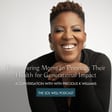
![Life after [baby] loss A conversation with Alishia Anderson image](https://media.zencastr.com/cdn-cgi/image/width=112,quality=85/image-files/61fb5028559b7100aee9f217/492cabf0-4479-488c-b19c-2873fe6bdce8.png)

